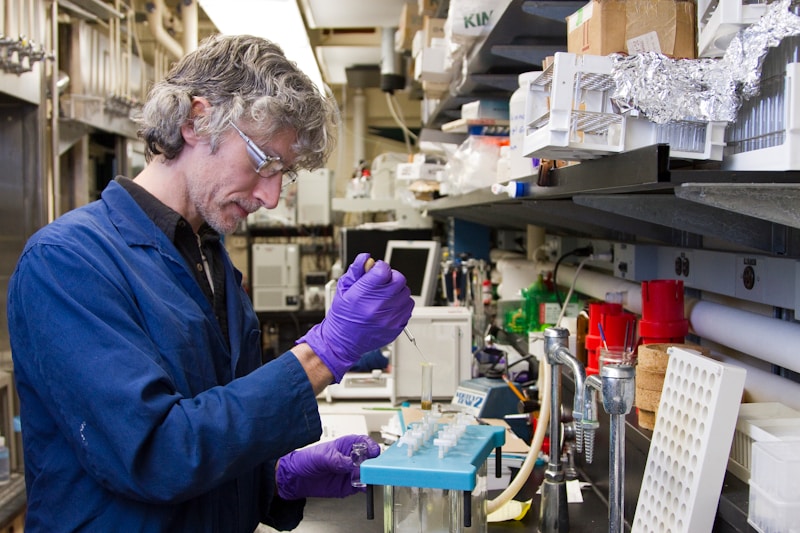Questions and Answers
What is the main focus of cell biology?
The investigation of the structure, function, and interactions of cells within living organisms.
Name two key components of a cell's structure.
Nucleus and mitochondria
What are the two key processes involved in cell division?
Mitosis and meiosis
How do cells communicate with each other?
Signup and view all the answers
What are two challenges in studying cell biology?
Signup and view all the answers
Where can scientists find scientific articles related to cell biology?
Signup and view all the answers
What is the role of DNA in encoding genetic information?
Signup and view all the answers
Explain the concept of variation in genetics.
Signup and view all the answers
What are some challenges associated with genetics research?
Signup and view all the answers
What are some key topics covered in scientific journals like Nature Genetics and Genome Research?
Signup and view all the answers
How do cell biology and genetics contribute to understanding living organisms?
Signup and view all the answers
What drives the changes in the genetic composition of populations over time?
Signup and view all the answers
Study Notes
Biology's Fundamental Lenses: Cell Biology and Genetics
Biology is a vast and intricate field encompassing the study of life at all scales, from the microscopic world of cells to the grand tapestry of ecosystems. In this article, we'll delve into two critical subtopics: cell biology and genetics, which form the foundation for understanding living organisms.
Cell Biology
Cell biology is the investigation of the structure, function, and interactions of cells within living organisms. It's the study of the tiniest units of life, breaking down their complexities into manageable concepts.
Key Concepts
- Cell structure: Components such as the nucleus, mitochondria, endoplasmic reticulum, and cell membrane are essential to understanding cellular function.
- Cell division: Key processes like mitosis and meiosis govern how cells reproduce and pass traits onto their offspring.
- Cell communication: Cells communicate with one another through signaling pathways and chemical messengers.
Challenges
- Complexity: Studying cell biology demands an understanding of intricate structures and processes, such as the intricate networks of intracellular organelles.
- Diversity: The variety of cell types and their functions within and between species presents a complex landscape to explore.
Resources
- Scientific articles detailing techniques and the latest research are available in peer-reviewed journals like Nature, Cell, and the Journal of Cell Biology.
- Textbooks like Molecular Biology of the Cell and online resources like BioJunction provide valuable information on cellular processes.
Genetics
Genetics is the study of inheritance, variation, and evolution, focusing on the transmission of genetic information within and between species.
Key Concepts
- Genetic material: The physical and functional nature of DNA and its role in encoding genetic information.
- Inheritance: The passing down of genetic information from parents to offspring.
- Variation: The differences observed among individuals within a population, which can be attributed to genetic differences.
- Evolution: The changes in the genetic composition of populations over time, resulting from natural selection, genetic drift, and migration.
Challenges
- Complexity: The interactions between genes and the environment lead to a wide array of genetic expression, which can be challenging to decipher.
- Ethics: Genetic research raises ethical questions regarding cloning, gene therapy, and the use of genetic information in society.
Resources
- Scientific articles in journals like Nature Genetics, Genome Research, and Genetics provide the latest insights into genetic research.
- Textbooks like Molecular Biology of the Cell and online resources like BioJunction offer valuable information on genetic processes.
Conclusion
Cell biology and genetics are integral to understanding how living organisms function. The complexity of their interactions and the challenges they present have led to some of the most fascinating discoveries in science. As we continue to unravel the mysteries of life, our understanding of these two subtopics will drive innovation and advancement in the biological sciences.
Studying That Suits You
Use AI to generate personalized quizzes and flashcards to suit your learning preferences.
Description
Test your knowledge on fundamental concepts of cell biology and genetics, exploring topics such as cell structure, cell division, genetic material, inheritance, variation, and evolution. Learn about the complexities and challenges within these fields that contribute to a deeper understanding of life.




